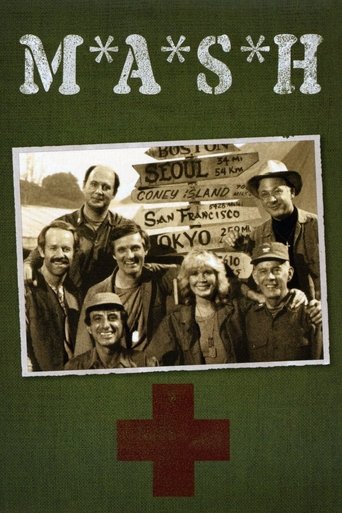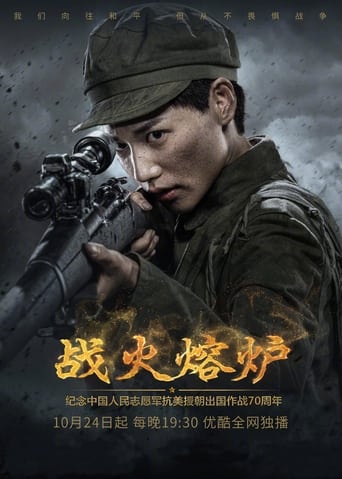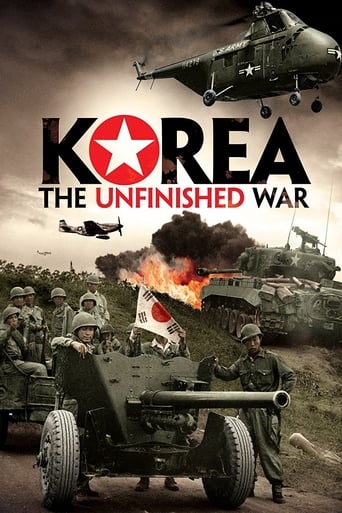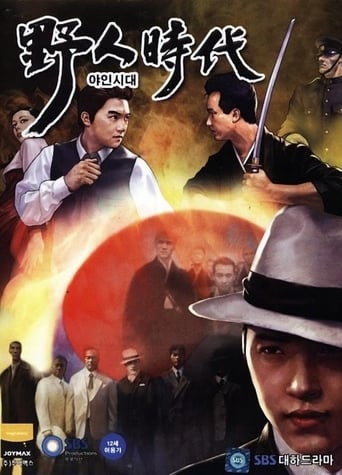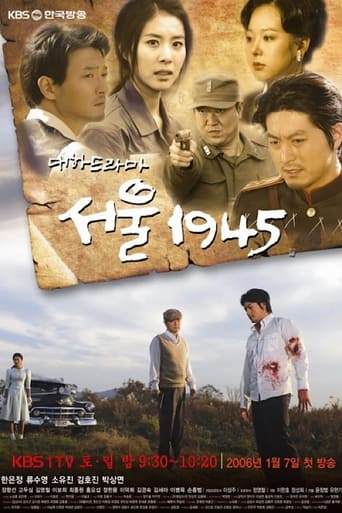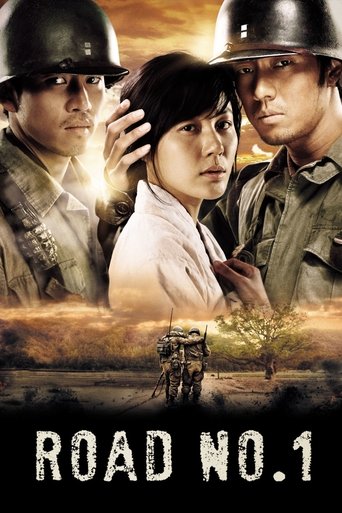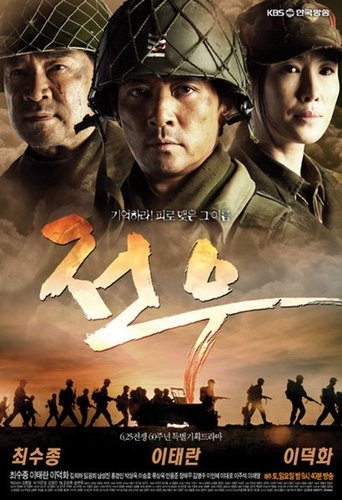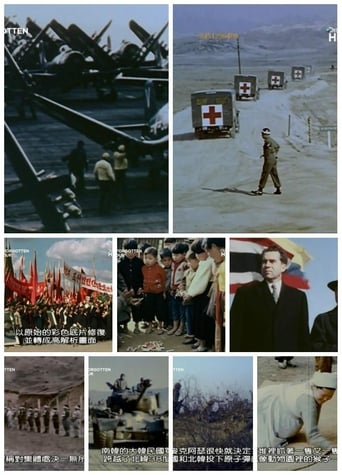
The Korean War Week 008 - The First UN Counterattack - August 13, 1950
The first UN large scale counterattack goes off this week; this by the American Task Force Kean. It has both successes and failures, and it runs right into a new North Korean offensive. The fighting happens just about everywhere on the Pusan Perimeter this week, though. That's the area into which the UN forces have been compressed, and it is particularly threatening at the Naktong Bulge. It is, plain and simple, a week of desperate and bloody fighting and that's about it.
- Indy Neidell
- Spartacus Olsson
- Astrid Deinhard-Olsson
Country: DE
Language: En
Runtime:
Season 1:
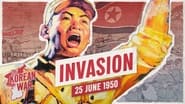
Despite the fact that there have been clear signs that they might soon invade South Korea, when the North actually does in force on June 25th, 1950, it comes as a complete shock to the world. But is this a full invasion, or just cross border raids such as there were in 1949? And is there something more behind this? Stalin's Soviets? Mao's Chinese? And how will the world react? Find out this week as our week by week coverage of the war begins!
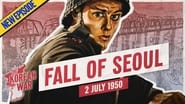
The North Korean forces are advancing all over, and this week they take Seoul, the South's capital city, after just a few days of the war. There is another tragedy for the South when the Han River Bridge is blown while thousands of people are crossing it, resulting in hundreds of civilian deaths. The World responds to the invasion- condemning it everywhere, and the Americans decide to send in ground forces to help the South.

American troops have arrived in Korea and engage the KPA- the forces of the North- in the field this week for the first time. It does not go well for them. In fact, it's hard to imagine it going worse. The Americans are outnumbered and outgunned and are routed. In fact, the KPA are advancing all over the country, though they are taking heavy casualties themselves.
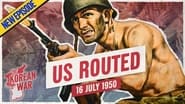
Elements of the US 24th Division, the only American one that's arrived in force in Korea so far, take on the North Korean forces aiming for Taejon, but they are badly- and easily- defeated each time. In the center and the east coast it's the ROK- the forces of the South- that are reorganizing and getting into position to try to stop the enemy. And Douglas MacArthur is officially appointed commander of all UN forces in Korea.

Taejon falls this week to the advancing North Korean steam roller, but the fight there is complete chaos that even sees the top American General fleeing into the local hills. However, two divisions of American reinforcements have arrived and perhaps they can turn the tide. The US also has decided to massively increase its defense spending and conscript tens of thousands of men, which may well help to do that.
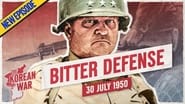
The UN Forces have been pushed back ever further, but this week, US 8th Army Commander Walton Walker issues the order to 'stand or die'; he sees no other options. American reinforcements are finally getting into the actual fight, though, and Britain has decided they will send in ground troops, so things might turn around... if they can hold out long enough for those troops to arrive, because a brilliant North Korean strategy might win the war and soon.

The UN forces are withdrawn this week across the Naktong River into a new defensive zone in the Southeast corner of the Peninsula- the Pusan Perimeter, but already as the week begins they are in great danger from the right hook near the coast by the North Korean 6th Division, that threatens to upend everything, taking Chinju and aiming for Masan. There are also machinations afoot with the Chinese in Taiwan, and the fear that a larger war could erupt if things aren't handled right concerning the Chinese; it's a week full of tension.
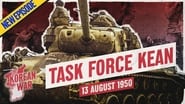
The first UN large scale counterattack goes off this week; this by the American Task Force Kean. It has both successes and failures, and it runs right into a new North Korean offensive. The fighting happens just about everywhere on the Pusan Perimeter this week, though. That's the area into which the UN forces have been compressed, and it is particularly threatening at the Naktong Bulge. It is, plain and simple, a week of desperate and bloody fighting and that's about it.
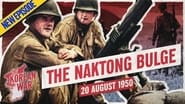
The Marines are deployed to back up the UN forces facing disaster in the Naktong Bulge and by the end of the week the tide has turned, and the crack North Korean 4th Division has been shattered. There is also fighting around the whole rest of the Pusan Perimeter, and it is shrinking from all the attacks, though on the east coast the battle goes in favor of the South Korean forces this week at Pohang-Dong.
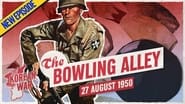
Douglas MacArthur has a plan for an amphibious invasion of Incheon, and he thinks it will turn the tide of the war. This week comes his heavy pitch to be allowed to do it to the powers-that-be among American command. The war in the field continues as the UN forces win the Battle of the Bowling Alley, but an air force attack accidentally hits targets over the border in China. Mao Zedong is furious. Also, MacArthur gets flak this week from the President for outspokenly advocating actions counter to US official policy with regard to China, so the Chinese situation grows ever more tense.
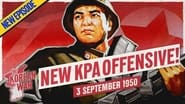
The North Korean forces launch a huge new offensive against the entire Pusan Perimeter, hoping to break through at least somewhere along the line. They are aware that time is of the essence, for the UN forces grow in number daily, while they are losing a battle of attrition. Some new UN arrivals this week are the first British ground troops in Korea for the fight. Meanwhile, Douglas MacArthur's plans for his upcoming surprise counteroffensive hit all sorts of snags thanks to Korean geography.
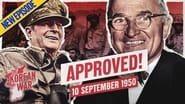
Douglas MacArthur's brazen plan to land two full divisions far behind enemy lines and sabotage the North Korean logistics finally gets the green light from the President and the Joint Chiefs of Staff, despite the myriad difficulties everyone knows the operation will face. It is to go off next week. In the field, the North Korean offensive against the Naktong Bulge continues, though it seems to be running out of steam, and the UN forces get beefed up as the first British troops to arrive in Korea join the battle line.
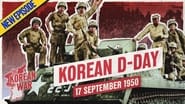
This week sees the UN forces execute Operation Chromite, the amphibious invasion of the port of Incheon, far behind enemy lines. There are many hurdles to clear before this can happen, including the physical one of one of the world's largest tidal ranges, which leaves many kilometers of mud flats in the approaches. There is also a UN counterattack at the same time, designed to perhaps break out of the Pusan Perimeter, or at least tie down big chunks of the enemy in the south.

Last week's amphibious invasion of Incheon completely surprised the North Koreans, and there are now thousands of UN troops deep in their rear and their logistic system is totally compromised; on top of that, as this week begins in the south, the UN forces begin breaking out of the Pusan Perimeter, first in a trickle, but by the end of the week in a huge torrent of force, running through, around, and over the North Korean forces.
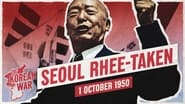
My, how the tide has turned. Less than two weeks ago, US X Corps landed at Incheon, far behind enemy lines, and already this week they take Seoul, the South Korean Capital. Not without a fight, however, and the result is serious tension in US High Command. There are more UN advances in the field, though, and troops of US 8th Army advance north, and link up with those of X Corps, making a solid, united front, trapping many thousands of North Korean soldiers in South Korea.
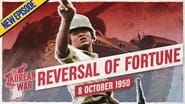
This week the KPA continue to grapple with the hole made by the landings at Incheon, as South Korean forces push past the 38th Parallel. MacArthur's attention, however, is already on his next big gambit: a landing at Wonsan. South Korean forces may very well beat him to the punch, though, as their drive north continues. Beyond the Yalu River, Mao Zedong watches these developments closely, and plans his response.
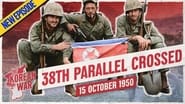
The American forces- and British Commonwealth ones- join the South Koreans in crossing the 38th parallel and invading North Korea this wee, though large scale resistance by the North Korean forces has to a large extent dissolved. This means that the planned Allied amphibious operation against the port of Wonsan- already delayed by minefields- is no longer really useful, since the South Koreans take the port already this week. And even as American brass meets on Wake Island and discounts the thought of Communist Chinese troops helping the North Koreans, Mao Zedong is preparing for an invasion of his own.
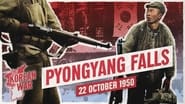
The North Korean capital falls to the UN forces, which isn't really surprising since the North Korean armies have been completely routed. However, the Chinese are entering the country in droves to back up the Northern forces, which UN Commander Douglas MacArthur is unaware of despite endless recon sorties every day. In other aerial news, an unlikely apology from MacArthur manages to soothe the Soviets after UN planes hit targets in the USSR, but what's really the story there?
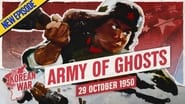
Communist Chinese forces make themselves known on the battlefield in a big way, and openly engage UN troops for the first time. What was supposed to be a stroll to the Chinese border turns into a week-long nightmare. How do the South Koreans of ROK II Corps perform in battle against this new threat? And how will Douglas MacArthur and his staff respond?
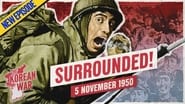
American forces drive onwards, almost oblivious to the emerging Communist Chinese threat. At Unsan, an American regiment finds itself at the mercy of two Chinese divisions, who bear down on it from three sides. Getting out before being overrun will be no easy feat.
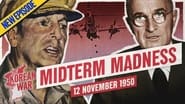
MacArthur's forces struggle to make sense of the recent Communist Chinese intervention in Korea, especially when the Chinese vanish as quickly as they arrived. Back in the US, the war's popularity has reached an all-time low on the eve of the crucial 1950 Midterm Elections. Is MacArthur about to pay the price for his failure to deliver results on the ground?
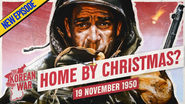
Eighth Army commander Walton Walker makes his final preparations for the big push north to the Yalu River. The Communist Chinese prepare their own forces and wait for the Americans to make their move. At the same time, the freezing Korean winter arrives in force, plunging temperatures well below freezing. The Americans must get this done, and soon.
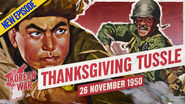
Thanksgiving 1950 comes and goes in the snowy north of Korea, and Eighth Army's push to the Yalu River begins the following day. It soon becomes apparent, though, that the Communist Chinese are ready and waiting for them, in numbers greater than anyone on the UN side have predicted. After weeks of preamble and preparation, the two forces finally collide in full strength.
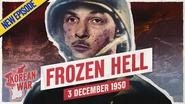
On and around the frozen waters of the Chosin Reservoir, the US Marines and the Chinese Communist forces fight out a brutal battle. In the west, the Chinese offensive continues. For the UN forces, there is no chance of victory, but living to fight another day may yet be possible.
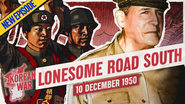
This week, UN forces in the west pull out of the North Korean capital Pyongyang. In the east, the marines continue to fight their way towards safety. Over in Washington, the aftershocks of the Chinese intervention have shaken high command as much as they have the troops on the ground, and America's allies, especially Britain, grow alarmed over the US response.
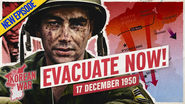
The last UN forces still in the northern half of Korea begin their frantic retreat by sea. The evacuation is a huge operation involving over 100,000 men, and needs to go off smoothly if the UN want any hope of halting the Chinese advance. Eighth Army, who spend this week retreating, are certainly not up to the task on their own.



